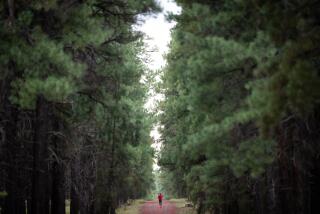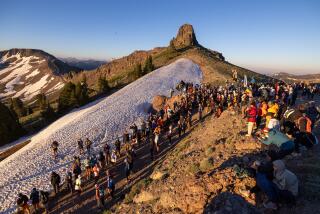Ordinary Marathon Runner Sets Personal Best
He was just an ordinary guy out for a Saturday morning run. But on the same day that the Stanford Cardinal claimed its second consecutive NCAA baseball title before a large crowd in Omaha, this Stanford alumnus toiled in anonymity.
Brentwood lawyer Frank Poturica of Manhattan Beach tackled the 22nd annual Palos Verdes Marathon on a recent Saturday with all the vigor of a man in a championship contest. Yet, like most of the 700 runners who took on the hilly seaside course, the 5-foot-9, 160-pounder ran for little more than personal gain. Poturica’s goal: to arrive at the finish line at Palos Verdes High School under the four-hour barrier that had eluded him in two previous finishes on the course.
Succeed or fail, he realized, there would be no cheers nor high fives at the finish, as there were in Omaha when Stanford defeated Arizona State, 9-4, for the collegiate title. Even his wife, Melanie, remained home to take care of their 2-year-old son, Vincent.
So, with entry number 173 pinned to his shirt, Poturica ran as an unknown, like so many others, racing against himself and against the clock.
“With running, you either love it or hate it, there is no in-between,” he said.
Poturica did not expect to finish first. Far from it. Tyrus Deminter of Gardena did that in 2:26.33. Poturica figured that if he just finished somewhere in the second half of the pack, it would be a decent run.
Most runners just wanted to finish, period. Most were tall and lean and their faces bore the strained looks that continuous distance running bestows upon them.
Few Stars Enter
“We’ve seen (stocky guys) never finish,” said race director George Owen of the Palos Verdes Estates Kiwanis Club.
Few stars compete. Race management decided a decade ago not to offer top amateur runners, a la the Boston or L.A. marathons, prize money for tackling the 26-plus-mile course.
“We give ‘em a T-shirt and a hat,” Owen said. “This is a home-grown affair.”
From a high of 3,500 runners eight years ago, the entry list has dwindled substantially. Even without prize money, the small field is a surprise since the course is considered the most physically demanding in Southern California outside of the exclusive Santa Catalina marathon, which is open only to elite runners.
Consequently, sponsorships are hard to come by.
“There aren’t many freebies here,” Poturica said after picking up his T-shirt and hat. “Not like other races I’ve run.”
A Long Beach native, Poturica took up running as an undergraduate at Stanford in the mid-1970s to stay in shape. He continued while studying law at USC. Five years ago he ran his first 10-K in Manhattan Beach and became hooked on distance running. The recent Palos Verdes event was his 11th marathon.
Poturica described his high school athletic career, where he did not earn a varsity letter, as “very average.”
“I spent more time in speech class than in P.E. I thought of myself as an athlete, but I really wasn’t.”
His best time: 3:28 in his first race three years ago on the relatively flat course of the Long Beach Marathon.
But “on the hill,” as P.V. is known, he figured he would be doing great if he ran a pace of nine minutes per mile. That would be around the four-hour mark.
What transpired was a Poturica P.V. personal best of 3:52.50. The time shocked the 33-year-old law partner, who often spends his lunch break jogging along San Vicente Boulevard near his office on Wilshire Boulevard.
“This is encouraging,” he said after completing the P.V. course.
It was overcast and a bit foggy on top of the hill and the temperature was in the low 50s when the race began. Poturica arrived about 15 minutes before the race. He makes it a habit to arrive “as late as I can.” Nervousness dissipates in the car during the drive, he said.
Other runners were warming up at nearby Rolling Hills High School. In bright sweat suits and lightweight running shorts, they jogged around the parking lot of the school, a quarter of a mile from the starting line on Indian Peak Road west of Hawthorne Boulevard.
“Those are the real runners. They have energy to burn,” Poturica said. “Me, I’ll be on the course four hours.”
Establishing a personal pace is a crucial element, Poturica said. “The worst part is getting to a race and standing around with your arms folded waiting for it to begin.”
Knowing how your body functions is important, too. He abstained from drinking alcoholic beverages two weeks before the race, and about four days before the event he “carbo-loaded,” eating foods high in carbohydrates that provide more fuel that protein-laden meals of red meat.
A hilly course like P.V. makes it crucial that each runner learn to set his own standards, Owen said. “You have to practice to finish this race.”
Indeed, the course begins at an elevation of 1,400 feet and drops to 500 feet above sea level. It winds through a variety of terrain, much of it hilly.
At the 5-mile mark Poturica was barely sweating. He made the turn up Crest Road from Hawthorne Boulevard and through the private gate of Rolling Hills.
“Feeling good,” he said. He was running in the first third of the pack.
Ten miles later he spotted his mother, Jean, in the handful of spectators along the San Pedro side of the race. Approaching the 18-mile mark at Golden Cove, he was sweating, even though a stiff breeze off the Pacific sent shivers through a small crowd that cheered each runner.
“I’m OK,” he shouted, taking on water at an aid station. “Starting to feel my legs a bit, but doing good.”
He feared this part of the race the most. His major nemesis has always been the 17- to 19-mile barrier. He calls it “my own personal wall.” To prepare for it, he built up his training in the weeks before the race and had run 22 miles through Torrance, Hermosa Beach, Manhattan Beach and Dockweiler.
The technique apparently helped, because he extended his personal wall well beyond 20 miles. In fact, he cruised through the 17-19-mile portion of the race without much problem.
At the 21-mile mark, along Palos Verdes Drive West, a timer called out his split at 3:05.07.
“Doing great. Real great,” he grunted.
At 23 miles, as he disappeared toward Lunada Bay along roads lined with spacious homes, he looked strong, although his dark hair was matted to his head and his black mustache was dripping with sweat.
Then, somewhere in the final 3 1/2 miles, he felt the urge to quit. He had discovered a new wall.
“I told myself I wouldn’t walk,” he said. But his legs didn’t agree.
“I basically no-brained the last 5 miles,” he said. “I didn’t think about anything. I just ran.”
Three hours and 51 minutes after he started, Poturica appeared on an access road that led to the finish at Palos Verdes High School. He was glistening with perspiration in the morning sunshine. He looked a bit weak. But he made his way into the football stadium and around the final 300 yards of a dirt track. When he crossed the finish line in front of the official clock, he raised his arms in triumph.
There was no one to greet him, but that did not matter. He had shattered his best time here and that made him feel like a champion.
More to Read
Go beyond the scoreboard
Get the latest on L.A.'s teams in the daily Sports Report newsletter.
You may occasionally receive promotional content from the Los Angeles Times.









